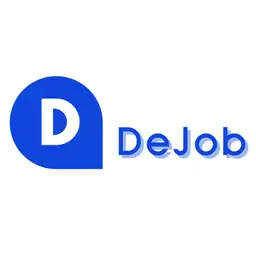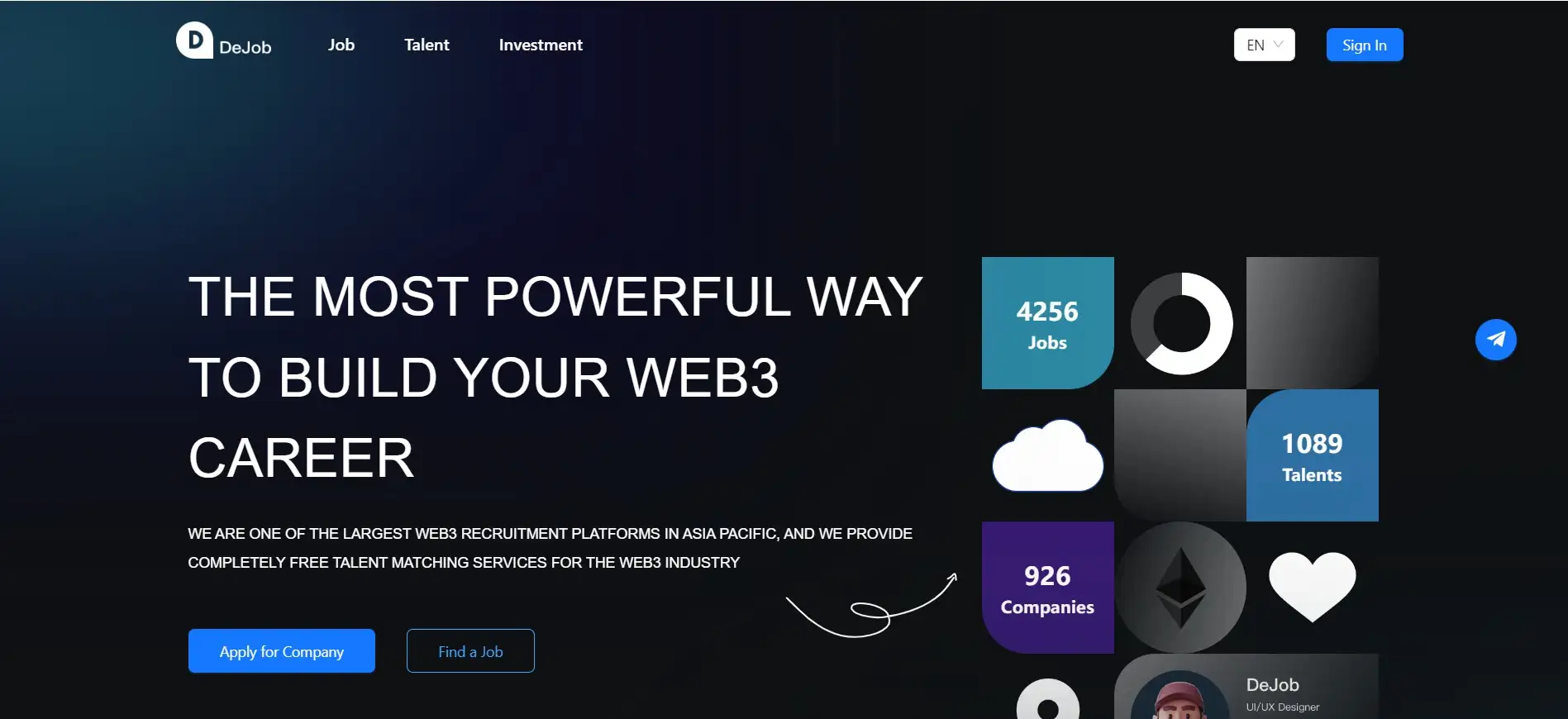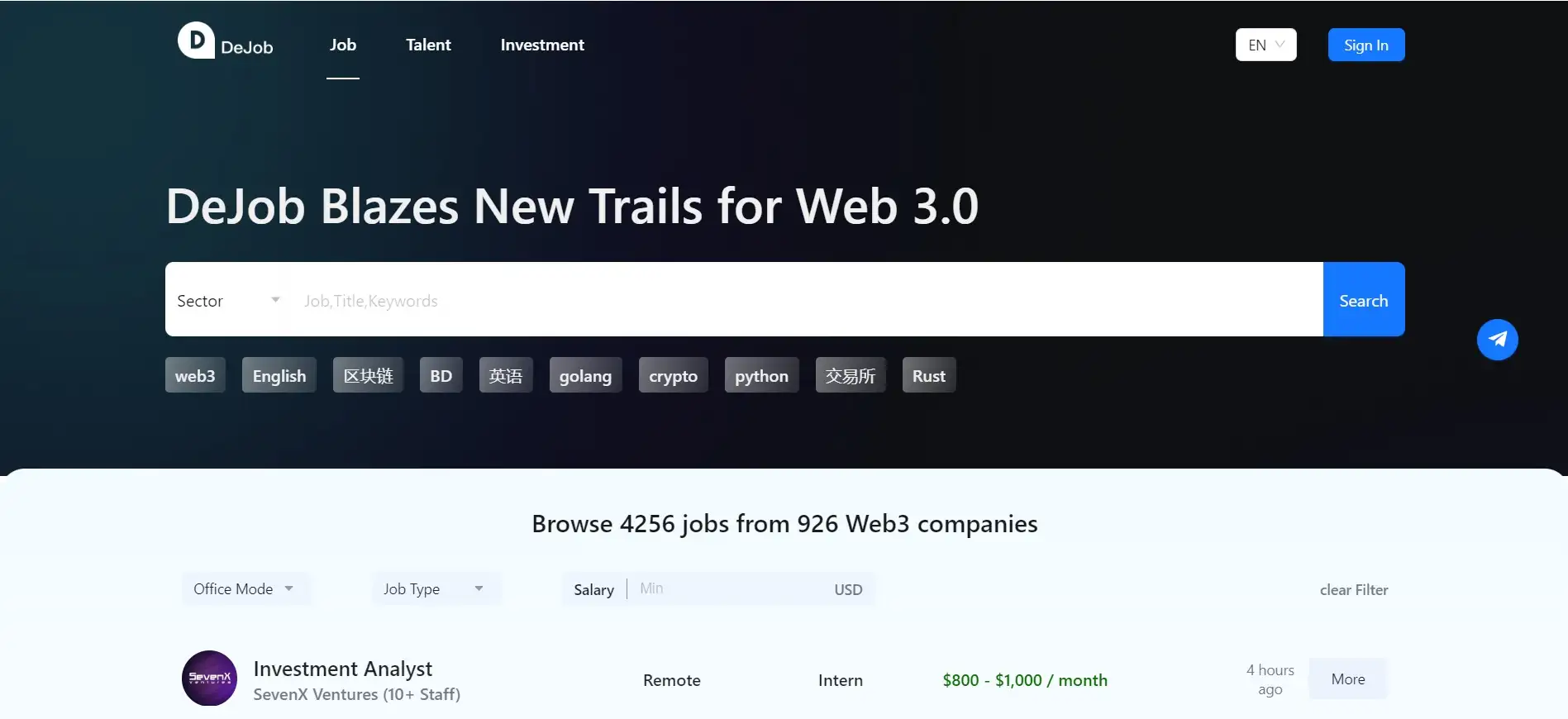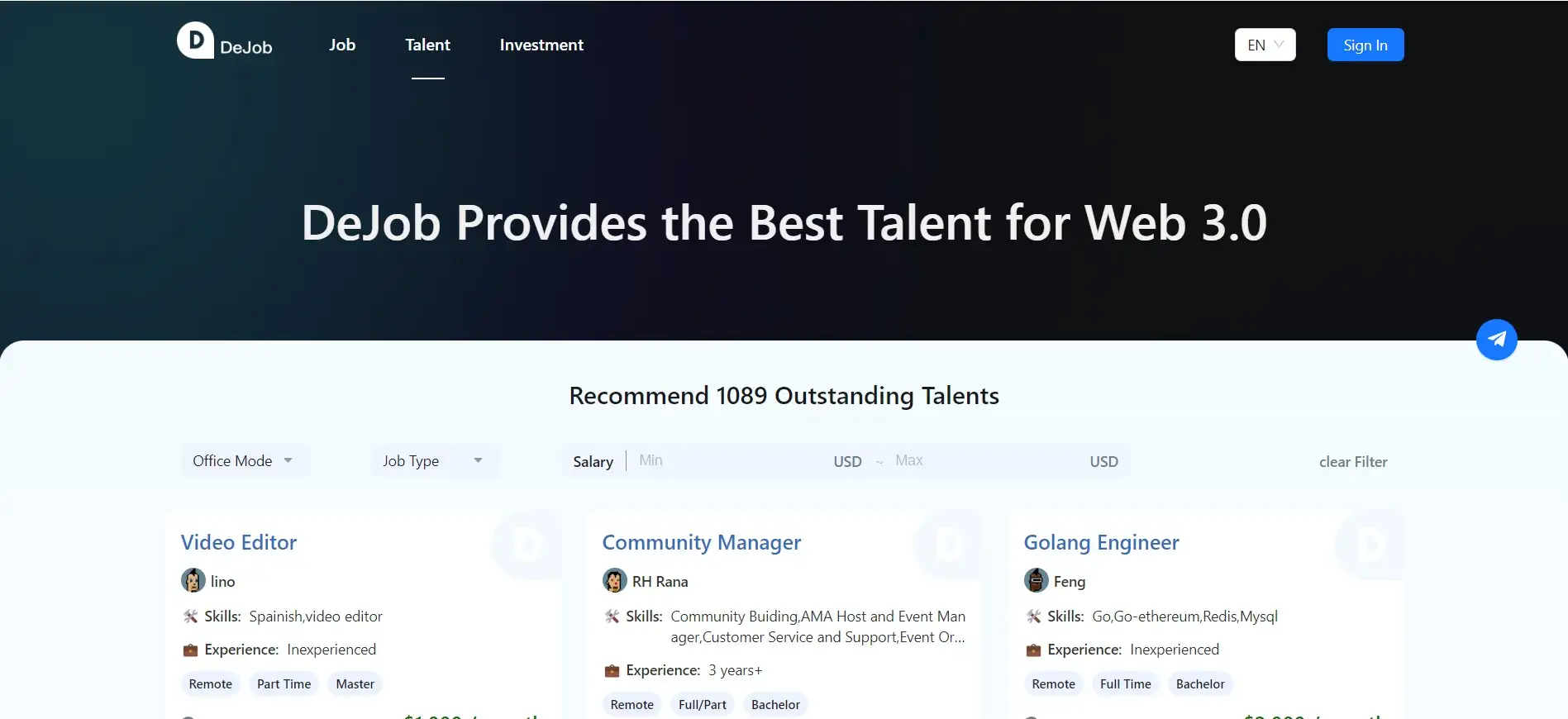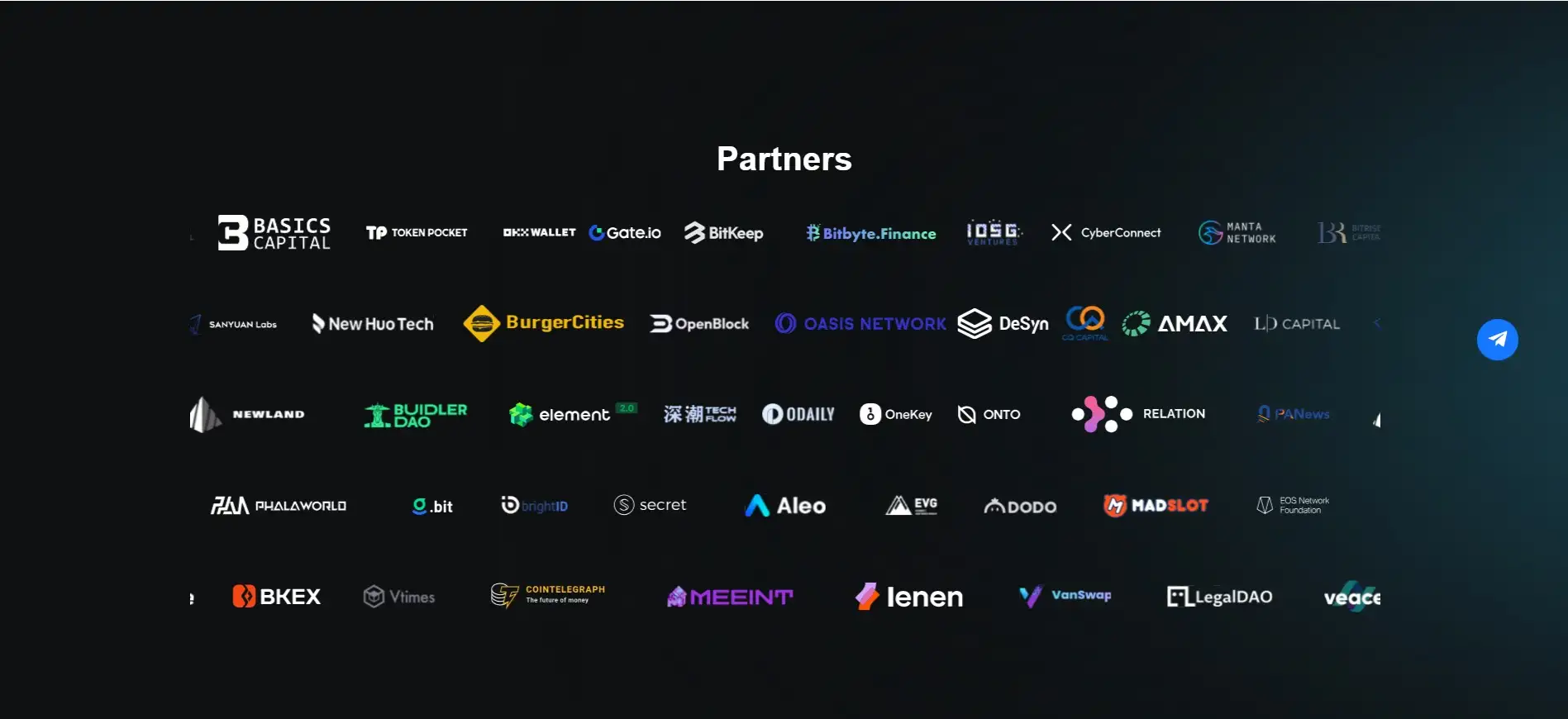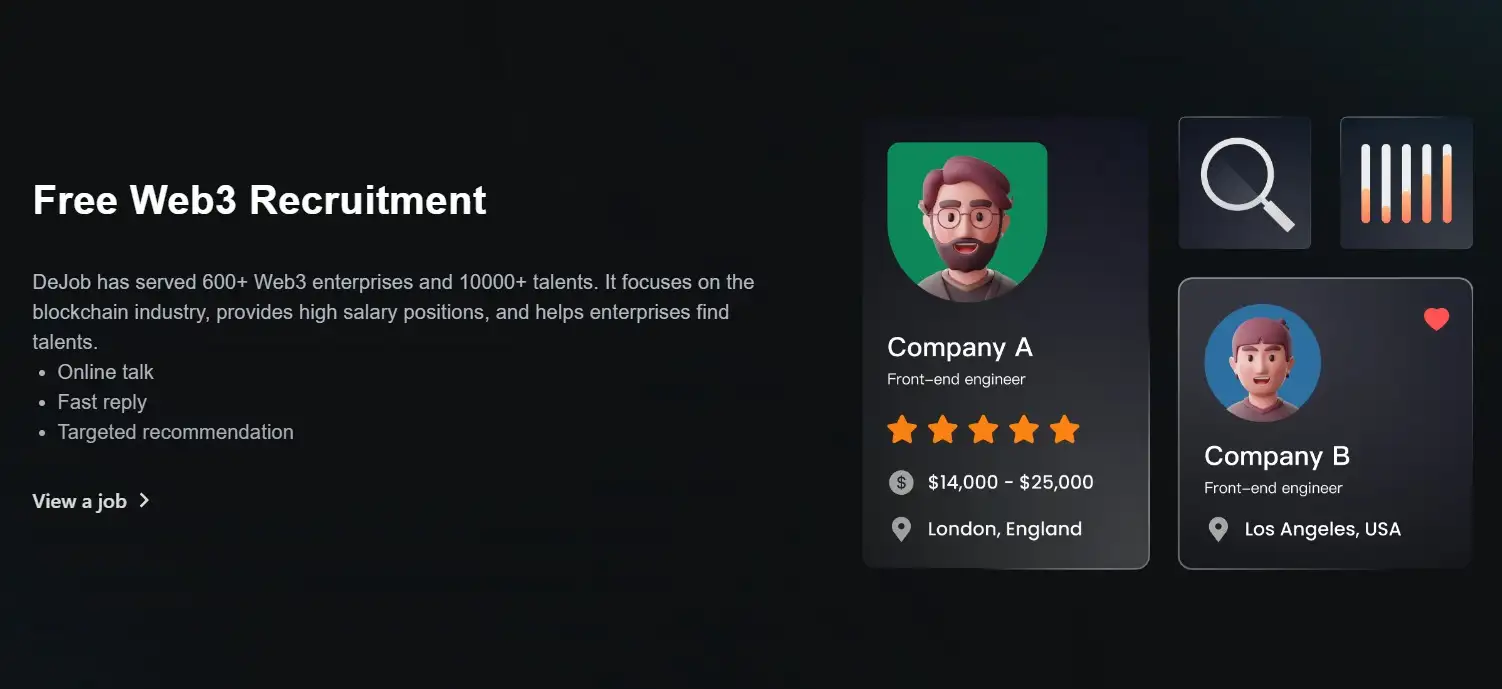About DeJob
DeJob is a pioneering Web3 recruitment platform designed to meet the specific needs of the decentralized economy. In a world where blockchain and decentralized technologies are rapidly transforming industries, DeJob offers a specialized solution for connecting employers with top-tier talent in the Web3 space. The platform serves as a comprehensive tool for both companies and job seekers, facilitating seamless interactions and efficient hiring processes.
DeJob’s mission goes beyond just filling positions; it aims to build a thriving community of Web3 professionals and enterprises, enabling the decentralized economy to reach its full potential. Whether you are an employer looking to hire or a professional seeking opportunities in the blockchain space, DeJob offers a robust, secure, and efficient platform tailored to your needs.
DeJob is more than just a job board; it’s a fully integrated recruitment ecosystem tailored for the Web3 economy. Since its launch in late 2022, DeJob has expanded its services rapidly, becoming a cornerstone in the decentralized job market. The platform connects over 600 Web3 enterprises with a vast talent pool of more than 10,000 professionals, offering a range of services that include job listings, talent matching, on-chain crowdsourcing, and decentralized identity (DID) technology.
The Web3 industry, characterized by its decentralized nature and reliance on blockchain technologies, demands a specialized approach to recruitment. Traditional job platforms often fall short of meeting the unique needs of this rapidly evolving sector. DeJob addresses this gap by providing a platform specifically designed to accommodate the decentralized and often remote nature of Web3 work. Its services cater to a broad spectrum of roles, from software development and blockchain engineering to marketing and operations within the Web3 ecosystem.
One of DeJob’s key innovations is the integration of decentralized identity (DID) technology. This feature allows both companies and job seekers to create verified, transparent profiles on the blockchain. For employers, this means they can trust the credentials of potential hires, while job seekers can ensure that their professional histories are accurately represented and verified. This level of transparency is critical in the Web3 space, where trust and security are paramount.
DeJob also offers an on-chain crowdsourcing platform, allowing companies to post tasks and find freelancers for short-term projects or specific needs. This feature supports the flexible working styles that are common in the Web3 industry, where professionals often work across multiple projects and companies simultaneously. By providing a decentralized platform for these interactions, DeJob ensures that all parties involved can engage in a secure, transparent, and efficient manner.
The platform's roadmap demonstrates its commitment to continuous growth and innovation. Following the successful launch of its recruitment and crowdsourcing platforms, DeJob plans to introduce a Web3 incubator, further solidifying its role as a key infrastructure provider in the decentralized economy. This incubator will support the development of new projects and companies within the Web3 space, providing resources and mentorship to help them succeed.
DeJob's competitors include platforms like LaborX and Cryptojobs, but DeJob differentiates itself through its comprehensive on-chain solutions and focus on decentralized identity and crowdsourcing. This focus on innovation, transparency, and community building positions DeJob as a leader in the Web3 recruitment space, offering unmatched value to both employers and job seekers.
DeJob offers a wide range of benefits and features that set it apart from other recruitment platforms, especially in the Web3 space:
- Specialized Web3 Recruitment: DeJob is designed specifically for the Web3 industry, providing a platform that connects employers with highly skilled professionals in blockchain, decentralized finance (DeFi), and related fields. The platform supports both remote and on-site positions, catering to the global nature of the Web3 workforce.
- Decentralized Identity (DID) Integration: One of DeJob’s most significant features is the integration of decentralized identity (DID) technology. DID ensures that all profiles on the platform are verified and transparent, which is crucial for building trust in the Web3 community. This technology allows employers to verify the credentials of job seekers, and job seekers can ensure their professional histories are accurately represented on the blockchain.
- On-Chain Crowdsourcing: DeJob’s on-chain crowdsourcing platform allows companies to post tasks and find freelancers for specific projects. This feature is particularly useful in the Web3 industry, where many professionals work on a contract basis across multiple projects. The on-chain nature of this feature ensures transparency and security in every transaction, providing peace of mind for both employers and freelancers.
- Global Talent Pool: DeJob offers access to a vast, global talent pool, with over 10,000 professionals and more than 4,300 job listings from 932 companies. The platform’s global reach is particularly beneficial for Web3 companies, which often require specialized skills that may not be available locally.
- Free Talent Matching Services: DeJob provides free talent matching services, making it easier for companies to find the right candidates quickly and efficiently. The platform’s advanced matching algorithms consider the specific needs of Web3 projects, ensuring that employers are connected with professionals who have the right skills and experience.
- Roadmap for Continuous Innovation: DeJob is committed to continuous growth and innovation. The platform’s roadmap includes the launch of a Web3 incubator and other features that will further enhance its offerings. This commitment to innovation ensures that DeJob remains at the forefront of the Web3 recruitment industry.
- Community-Oriented Approach: DeJob is more than just a job platform; it’s a community for Web3 professionals. The platform fosters a sense of community by connecting like-minded professionals and offering resources that support their growth and development in the Web3 space.
- Flexible Working Styles: DeJob supports flexible working styles, recognizing that many Web3 professionals work remotely or across multiple projects. The platform’s features are designed to accommodate this flexibility, making it easier for professionals to find work that fits their lifestyle.
Getting started with DeJob is straightforward, but there are several steps to ensure you maximize the platform's offerings:
- Account Creation: Begin by visiting the DeJob website and signing up. The platform allows you to create an account as either an employer or a job seeker. Ensure that you use a professional email address and provide accurate information during the sign-up process to facilitate verification.
- Profile Completion: After account creation, the next step is to complete your profile. For job seekers, this means adding your skills, experience, and job preferences. Be as detailed as possible, as this information is critical for DeJob’s talent-matching algorithms. Employers should focus on filling out their company profiles, specifying the types of roles they are looking to fill, and providing a clear description of their company and its culture.
- Explore Job Listings: Job seekers can explore thousands of job listings tailored to the Web3 industry. Use the platform’s robust search features to filter jobs by sector, job type, salary, and location. Whether you’re looking for a full-time position, part-time work, or freelance opportunities, DeJob has options that cater to all kinds of professional needs.
- Decentralized Identity (DID) Verification: Both employers and job seekers are encouraged to verify their identities using DeJob’s decentralized identity (DID) feature. This step is crucial for building trust within the platform, as it ensures that all profiles are transparent and verified on the blockchain. For job seekers, DID verification can make your profile more attractive to potential employers.
- Apply for Jobs or Post Openings: Job seekers can apply for positions directly through the platform. Make sure to tailor your applications to each job, highlighting the most relevant skills and experiences. Employers, on the other hand, can post job openings and start receiving applications immediately. DeJob’s interface allows for easy management of job listings, applications, and communications with potential hires.
- Utilize On-Chain Crowdsourcing: Employers looking for freelance or short-term project workers can post tasks on DeJob’s on-chain crowdsourcing platform. This feature allows for quick and secure hiring, ensuring that all transactions are transparent and recorded on the blockchain.
By following these steps, you can fully leverage DeJob’s platform, whether you’re seeking new career opportunities in the Web3 space or looking to hire top talent.
DeJob Reviews by Real Users
DeJob FAQ
DeJob uses decentralized identity (DID) technology to verify the authenticity of both companies and job postings. This ensures that all listed opportunities are from legitimate employers, building trust within the Web3 recruitment space.
Yes, DeJob offers a diverse range of opportunities, including freelance gigs through its on-chain crowdsourcing platform, as well as part-time and full-time roles, making it versatile for all types of Web3 professionals.
Companies can post specific tasks or projects on DeJob’s on-chain crowdsourcing platform to quickly find freelancers with the required skills. This feature is ideal for decentralized projects that need to scale operations flexibly.
Absolutely! DeJob not only connects experienced professionals with opportunities but also provides a community where newcomers can learn, grow, and network within the Web3 ecosystem.
DeJob’s DID technology allows job seekers to create verified profiles on the blockchain, making their credentials transparent and trustworthy. This increases their attractiveness to potential employers in the Web3 industry.
You Might Also Like









